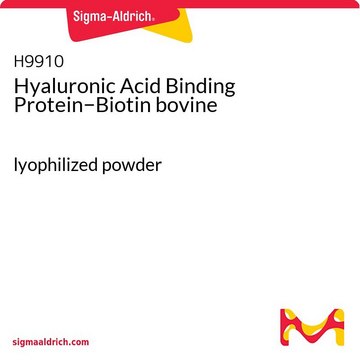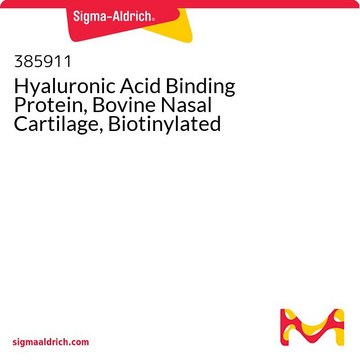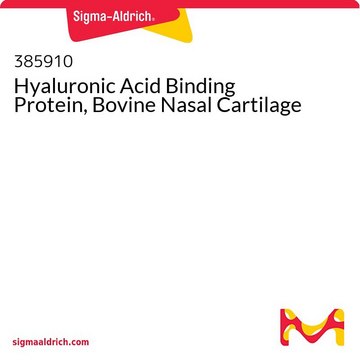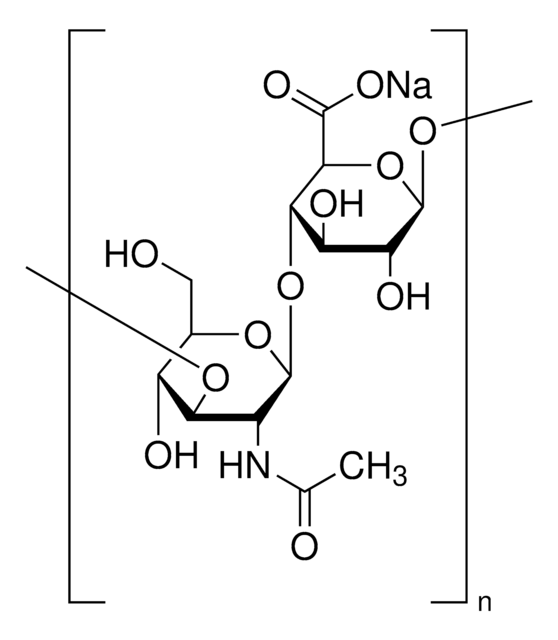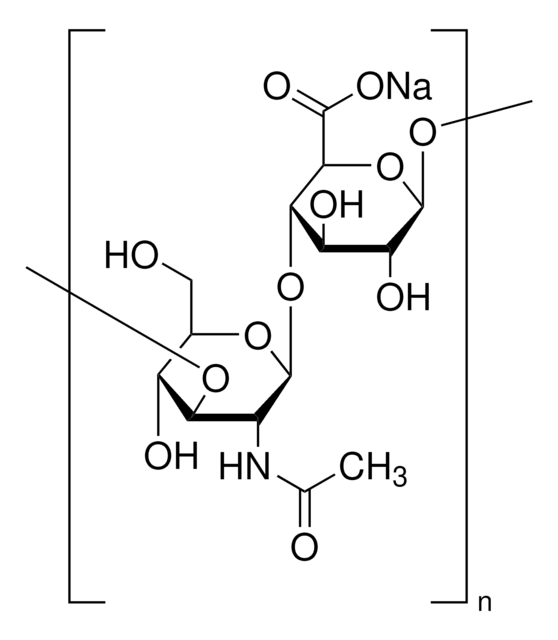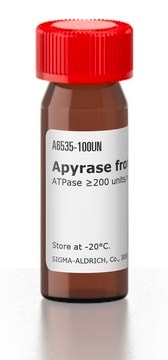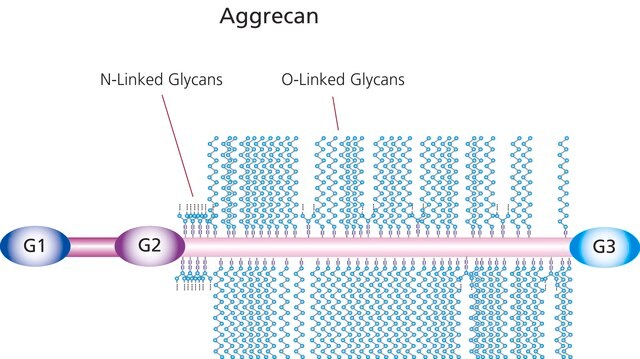H0161
Hyaluronic Acid Binding Protein bovine
lyophilized powder
Se connecterpour consulter vos tarifs contractuels et ceux de votre entreprise/organisme
About This Item
Produits recommandés
Source biologique
bovine
Niveau de qualité
Forme
lyophilized powder
Technique(s)
immunofluorescence: suitable
Numéro d'accès UniProt
Température de stockage
−20°C
Informations sur le gène
cow ... VCAN(282662)
Description générale
Hyaluronic acid (HA) is a linear polysaccharide consisting of a repeating disaccharide of N-acetyl D-glucosamine (GlcNAc) and D-glucuronic acid (GlcA) with 1→4 interglycosidic linkages and these disaccharide repeating units are in turn linked by β (1→3) linkages. The number of repeating disaccharides in a HA molecule ranges from 2,000 to 25,000, which relates to a molecular mass of 106-107. The unique biological roles of HA is mainly due to the specific binding and interaction with HA-binding proteins also known as hyaladherins. Most hyaladherins is composed of a specific binding domain, also called a link module, which is composed of two α-helices and two antiparallel β-sheets.
Karl Meyer and John Palmer first isolated hyaluronic acid (HA) from the vitreous of bovine eyes. They coined the name “hyaluronic acid” as a conjugation of two words, hyaloid (vitreous) and uronic acid. HA has an extended random coil structure in physiological solution. Due to its random-coil structure and high molecular weight (HMW), HA forms very viscose and elastic solution with a huge hydrodynamic volume.
Application
Hyaluronic Acid Binding Protein bovine may be used for incubation of specimens for immunofluorescence analysis of human megakaryocytes.
Actions biochimiques/physiologiques
Hyaluronic Acid Binding Protein (HABP) levels increases during oocyte maturation and it promotes cumulus expansion during in vitro maturation.
In addition to being an important structural component of tissues in all vertebrates, HA is also associated with several biological functions including intracellular signaling.
May be useful in hyaluronic acid binding or detection.
Code de la classe de stockage
11 - Combustible Solids
Classe de danger pour l'eau (WGK)
WGK 3
Point d'éclair (°F)
Not applicable
Point d'éclair (°C)
Not applicable
Équipement de protection individuelle
Eyeshields, Gloves, type N95 (US)
Certificats d'analyse (COA)
Recherchez un Certificats d'analyse (COA) en saisissant le numéro de lot du produit. Les numéros de lot figurent sur l'étiquette du produit après les mots "Lot" ou "Batch".
Déjà en possession de ce produit ?
Retrouvez la documentation relative aux produits que vous avez récemment achetés dans la Bibliothèque de documents.
Les clients ont également consulté
Hyaluronan based hydrogels provide an improved model to study megakaryocyte-matrix interactions
Currao M, et al.
Experimental Cell Research, 346(1), 1-8 (2016)
Identification of hyaluronic acid-binding proteins and their expressions in porcine cumulus-oocyte complexes during in vitro maturation
Yokoo M, et al.
Biology of Reproduction, 67(4), 1165-1171 (2002)
A G Haus
Radiologic clinics of North America, 25(5), 913-928 (1987-09-01)
Today there are many dedicated mammographic x-ray units available that are capable of providing high-quality screen-film mammograms. Likewise, screen-film combinations designed for mammography are capable of providing images with appropriate contrast, resolution, and noise levels. Proper film processing is most
G Perides et al.
The Journal of biological chemistry, 264(10), 5981-5987 (1989-04-05)
A glial hyaluronate-binding protein (GHAP) with an isoelectric point of 4.3-4.4 was isolated from human brain white matter. The 60-kDa glycoprotein appeared to be quite resistant to proteolysis, and comparison with GHAP from a viable glioma removed at surgery showed
Notre équipe de scientifiques dispose d'une expérience dans tous les secteurs de la recherche, notamment en sciences de la vie, science des matériaux, synthèse chimique, chromatographie, analyse et dans de nombreux autres domaines..
Contacter notre Service technique